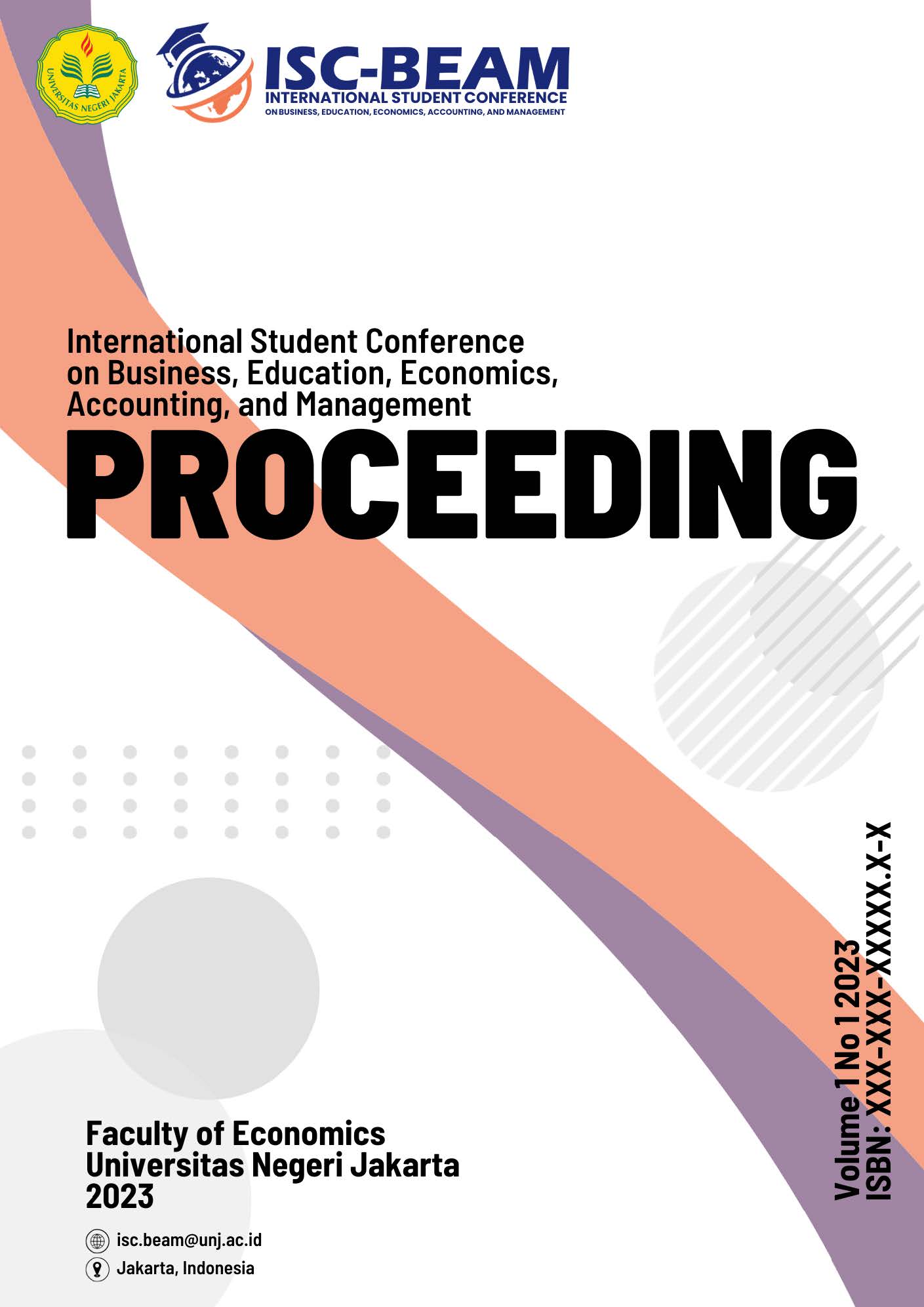Islamic Marketing In The Context Of Buying And Selling
DOI:
https://doi.org/10.21009/ISC-BEAM.011.61Keywords:
marketing, shari'ah, context, buying, sellingAbstract
Marketing in the context of Islam that is appropriate is marketing that follows the teachings and sunnah of the Prophet SAW. In the work environment, the attitude of maintaining honesty must be instilled so that consumers obtain various information about the products and services sold. The Prophet (peace be upon him) always guaranteed himself what he sold to his customers. The type of research used in this writing is literature research and the author collects information including books, scientific articles, research-related sources, and sources collected. Marketing is a science that is developing very quickly. So is the marketing department of a company with a very strategic position. This can be understood because marketing is a benchmark for a company's success. When a company/industry produces a product or service but cannot market it, the company it manages faces problems. Therefore, profits are the spearhead of the survival of a company. Marketing is a social process allowing individuals and groups to offer, produce, and exchange products and services freely. The results of this study can be seen that in the integration of Islamic marketing in the context of buying and selling, consumers, individuals, and groups will get their needs and desires by creating offers and exchanging products or value with other parties.
References
Ahmad, A. W., & Jasmi, K. azm. (2020). The Role of Islamic Marketing Ethics on Customer Satisfaction. University of Technology Malaysia.
Aravik, H., Amri, H., & Febrianti, R. (2022). the Marketing Ethics of Islamic Banks: a Theoretical Study. Islamic Banking : Jurnal Pemikiran dan Pengembangan Perbankan Syariah, 7(2), 263–282. https://doi.org/10.36908/isbank.v7i2.344
Biemans, W., Malshe, A., & Johnson, J. S. (2022). The sales-marketing interface: A systematic literature review and directions for future research. Industrial Marketing Management, 102(June 2021), 324–337. https://doi.org/10.1016/j.indmarman.2022.02.001
Fataron, Z. A. (2021). Hubungan Islamic Marketing Ethics dan Customer Satisfaction pada Perbankan Syariah. BISNIS : Jurnal Bisnis dan Manajemen Islam, 9(1), 87. https://doi.org/10.21043/bisnis.v9i1.10267
Fathoni, M. A. (2018). Konsep Pemasaran Dalam Perspektif Hukum Islam. Jurisdictie, 9(1), 128. https://doi.org/10.18860/j.v9i1.5135
Fitriyah, F., & Asri, K. H. (2023). Buying and Selling TikTok Social Media Followers According to Islamic Business Ethics. Alif, 1(2), 78–87. https://doi.org/10.37010/alif.v1i2.1023
Hasnidar, & Haslindah. (2021). Penerapan Etika Bisnis Islam Terhadap Perdagangan Sapi Di Kecamatan Tanete Riattang Barat Kabupaten Bone. Balance (Jurnal Ekonomi Dan Bisnis Islam), 3(2), 9–17. https://ejurnal.iainpare.ac.id/index.php/balanca/article/view/2624/1016
Kartajaya, H. (2002). Hermawan Kartajaya on Marketing. Gramedia.Kotler, P., & Keller, K. L. (2016). Marketing Management(Global Edi). Pearson Education Limited.Kotler, P., Kevin, K., & Chernev, A. (2021). Marketing Management. In Pearson(Vol. 53, Issue 9).
Kurniawan, D. A., & Fajri, F. S. (2019). Analisis Implementasi Islamic Store Attributes dan Bauran Pemasaran dalam Perspektif Islam (Survey pada La-Tansa Gontor Departement Store Ponorogo). JMK (Jurnal Manajemen Dan Kewirausahaan), 4(2), 85. https://doi.org/10.32503/jmk.v4i2.404
Kurtinaitienė, J. (2005). Marketing orientation in the European Union mobile telecommunication market. Marketing Intelligence & Planning, 23(1), 104–113. https://doi.org/10.1108/02634500510577500Nurhalimah, L., Siwiyanti, L., Fitriani, D., Maulana, H. S., & Maulana, A. (2022). Studi Literatur: Menerapkan Etika Bisnis Bagi Kepuasan Konsumen Dalam Islam. Majalah Ilmiah Manajemen, 11(3), 1–7.
Ramadhani, D. (2023). Islamic Marketers Multipurpose Products In. JPS (Jurnal Perbankan Syariah), 4(2), 180–192.Ramdan, A. M., Siwiyanti, L., Komariah, K., & Saribanon, E. (2023). Manajemen Pemasaran. Haura Utama.
Ramdan, A. M., Siwiyanti, L., Pertala, E. C., Anggraini, N., & Jhoansyah, D. (2022). Model Pendampingan Peningkatan Kinerja Pemasaran Kelompok Sadar Wisata Desa Kebonmanggu Kabupaten Sukabumi. In Academics in Action Journal(Vol. 4, Issue 1).
Satar, M., & Musmulyadi, S. 2. (2022). Jurnal Mirai Management Sistem Kegiatan Pemasaran dalam Perspektif Etika Ekonomi Islam. Jurnal Mirai Management, 7(2), 191–199. https://doi.org/10.37531/mirai.v7i2.2014
Sucilawati. (2020). The Concept of Shura in Islamic Governance: Practice of Shura during the Caliph Umar Bin Khattab. International Journal of Politics and Sociology Research. IJOBSOR, 8(1), 18–32.
Sumariati, Nashrulloh, G., & Kartika. (2015). Jual Beli Followers Media Sosial Instagram Dalam Perspektif Hukum Islam. Repostiory,Uniska, 1(3), 6.
Syafril, S., & Hadziq, M. F. (2021). Islamic Principles in Marketing: An Overview of Islamic Marketing mix in Social-Media Campaign. El-Qish: Journal of Islamic Economics, 1(1), 69–82. https://doi.org/10.33830/elqish.v1i1.1568.2021
Syahrul, H. (2012). Marketing Dalam Perspektif Hukum Islam. DIKTUM: Jurnal Syariah Dan Hukum, 10(2), 185–196.Wanawir Satriadi, E Hendrayani, L. S. (2022). Manajemen Pemasaran. Samudera Biru.






